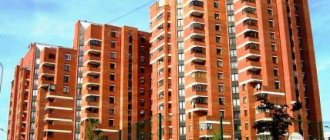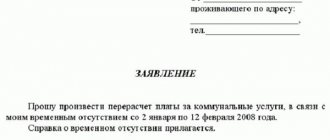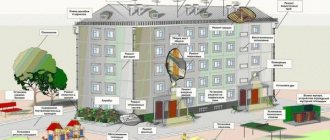The need to pay expensive utilities for an apartment often becomes the cause of controversial situations that sometimes arise even between members of the same family. The problem becomes even more urgent if several families or former relatives live in the apartment at the same time, for example, a husband and wife after a divorce. At the same time, as a rule, they each live in their own living quarters, maintain separate households and use electricity, water and other services based on their own needs.
There is only one bill for utility services, and, most often, a considerable one. Naturally, questions arise regarding who should pay for them and in what proportion. Often the situation is aggravated by the fact that one of the residents refuses or is unable to make payments. Existing housing legislation makes it possible to solve this problem in a relatively fair manner. It provides the opportunity to carry out the so-called division of the account, as a result of which each owner will be responsible for their debts independently.
Where good relations have been maintained, the issue is resolved peacefully, after going through the appropriate legal procedures. If there is a conflict, the initiators of the division will have to file a claim in court.
Law on payment of utilities by participants in common property
Russian legislation ensures that co-owners of shares in residential real estate are responsible for the maintenance and preservation of this housing. They are obliged to pay utility bills on personal accounts and the debts that arise on them.
Moreover, the responsibility for maintaining the property falls on the shoulders of each owner, in accordance with the size of the share (Article 249 of the Civil Code of the Russian Federation).
Let us list other legal acts, according to which, payment of utilities and other expenses associated with the maintenance and preservation of shared property will be borne by all participating owners of such housing:
- Article 30 of the Housing Code of the Russian Federation. It stipulates the responsibility of the owners for the maintenance of common property and payment of common house expenses, all rights and obligations.
- Article 153 of the RF Housing Code. It talks about the obligation of owners to pay for consumed utilities in full within the allotted time.
- Article 155 of the RF Housing Code contains a list of services that are subject to payment.
- Article 210 of the Civil Code of the Russian Federation says that the owner bears the burden of maintaining the property he owns, unless otherwise provided by agreement or law.
- Article 249 of the Civil Code of the Russian Federation fixes the obligation to pay all expenses associated with the maintenance of property.
Please note that non-use of the premises by the owners is not a valid reason for non-payment of housing and communal services. This is stated in Article 155 of the RF Housing Code.
Sharing a communal apartment
In addition to a separate entrance, each apartment must have a separate KITCHEN and WAN/UNIT, while their arrangement and equipment must not contradict regulatory documents and are technologically possible. You need to start by ordering a reconstruction project and getting it approved by multiple authorities. In standard series houses this is almost impossible. For an initial consultation, I advise you to contact the housing inspection.
Anton, there are 2 questions in your ad. I’ll risk it again: 1. Will the entrance “through a box for two apartments” work? Even a housing inspection specialist won’t say without seeing the BTI documents, the cadastral passport and your sketch of the box’s redevelopment. 2. Collided. All issues were resolved in agreement with the housing inspection of the relevant administrative district. Absolutely necessary at the reception: a cadastral passport for the apartment, a floor plan and an explication, and, for starters, your sketch, at least by hand. In the future, a sketch will not be enough - absolutely, a project will be required. The list of design organizations is available in the housing inspectorate, or you can choose yourself; the price of the project + approvals are determined for each specific case.
Agreement between the parties to pay for housing and communal services - is it necessary to go to court?
Shares in property rights can be established by a settlement agreement or a court decision (Article 244 of the Civil Code of the Russian Federation). According to the prescribed conditions, participants in shared property must be responsible for it, including fulfilling obligations to make timely payments for utility debts.
- Any participant in shared property may demand through the court to conclude an agreement on the procedure for paying for utility services, in proportion to each person’s share.
- But there is no need to go to court. If the parties can agree, then it is enough to go to a notary and draw up the agreement in documentary form.
If the owners cannot come to a mutual decision—for example, if one insists that he does not live in the property—then it is worth resolving the issue through the courts.
After you have the agreement in your hands, you must send it to the provider of housing and communal services, the management organization, and the companies with which the agreement was concluded with the original owner.
The agreement should be accompanied by a statement written jointly by all owners. It must indicate a request to make charges, in accordance with the new conditions fixed in the agreement, and to issue each owner with their own payment receipt.
The management company has the right:
- Divide personal accounts, make each owner their own account. Everyone will be sent their own receipts.
- Do not divide personal accounts, but issue separate receipts. We will talk about this below.
This method of payment for services allows you to balance the rights of each participant in shared ownership, and force those who ignore the legal requirements of housing and utility companies to pay utility bills.
It may be suitable both for citizens who were able to come to an agreement (after all, an agreement can be drawn up without a trial), and for those who have been fighting for the division of financial responsibility for common property for many years (in this case, only the court will help).
By the way , a representative of the Management Company or a housing and communal services organization, or the owner himself, whose rights have been infringed, can file for collection of a utility debt.
How to split a personal account?
The best option is the personal account section. To do this, you need to contact the Criminal Code with an application and documents on the right to property (certificate or extract from the Unified State Register). Subsequently, starting from the next month after a positive decision is made, a receipt will be sent determining the amount of payments for each owner.
If one of the owners refuses to divide the personal account, this can be done through the court without his consent . In addition to the statement of claim, you will need the same documents as for the Criminal Code. If the claim is satisfied, it is necessary to visit the management company with a court decision without a resisting owner, and then the account will be divided based on the judge's verdict.
Section of personal accounts, or what are separate utility payments
Participants in common shared property can divide personal accounts. Then each owner will be able to receive his own utility bill - and pay exactly as much as he consumes, or as much as is calculated, in proportion to his share for the common squares.
The procedure for separating accounts can take place in several stages, depending on the circumstances and the specific situation:
Stage 1. Appeal to all owners with a request to pay utility debts or pay payments in proportion to their share of rights.
Stage 2. Sending a written request to all participants in shared ownership.
Stage 3. Contacting the Management Company or organization responsible for the supply of housing and communal services. You should prepare a written statement requesting to split your personal account. Be sure to attach a document confirming ownership.
Stage 4. Go to court if the company refuses to partition you, and other owners ignore your requests. It is worth preparing a statement of claim.
Our lawyers will help you sort out the problem of dividing debts for utility bills, as well as dividing personal accounts. Their work involves providing advice on housing issues.
Based on a court decision, the management company or housing and communal services organization must divide the personal account. The best option is when each owner gets their own account and receives individual receipts. Thus, each owner will pay utility bills only in his own name.
In some cases, the bill may not be divided, but different receipts are sent for each owner. This is possible without going to court if the owners have reached a mutual decision and do not refuse to pay utility bills.
FAQ
Question No. 1. Can the owner be evicted from the property if there are debts for housing and communal services?
Yes, they can, but this requires a court decision. A management company or REU does not have the right to independently evict tenants - this is done as part of enforcement proceedings after legal proceedings.
Question No. 2. What to do if the receipt shows a debt for electricity supply, but in fact all payments were paid on time?
Electricity services are provided by electrical networks. To cancel the debt, you need to contact them with your old payment receipts, and then a recalculation will be made.
Enforcement measures against a participant in shared ownership for non-payment of utilities and taxes
Representatives of housing and utility companies can influence property owners to ensure that they pay utility bills on time and monitor the maintenance of housing.
Measures of influence on participants in shared ownership may be as follows:
- Warnings, notices, alerts, debtor list signs.
- Calculation of penalties on the total amount of debt. The percentage is equal to 1/300 of the refinancing rate of the Central Bank of the Russian Federation.
- Disabling service or limiting supply from a utility resource. The company has the right to turn off electricity, water, and gas if the owner has a large debt. Please note that in Russia the practice of disconnecting is very popular, even for late or non-payment of 2000-3000 rubles. the supply of the service may be restricted to you.
- Debt collection through court. The management company or service provider can sue a court of general jurisdiction and demand payment of utilities from each owner.
- Eviction. We will talk about this measure in more detail below.
The owner himself can recover paid utilities and other expenses from other shareholders. But, unfortunately, if he does not pay the debt and does not comply with the court decision, you are unlikely to impose a fine on him. This will already be the work of bailiffs. They will impose a fine for non-fulfillment of their demands at the expense of the state treasury, and not at the expense of the plaintiff owner.
The procedure for legalizing a section
In order not to break the law, if you set out to divide one apartment into two, you need to follow the following sequence of actions:
- Order an examination that will help determine the technical feasibility of the section.
- Contact BTI or independent engineering companies for a redevelopment project.
- Collect documents on ownership, grab the project, passports and go to the MFC or local government authority (LGU) responsible for approving the redevelopment. Submit documents, write an application.
- Wait for the verdict of the approval body (OMC).
- Challenge it in court if a refusal is received.
- Make a section on the project.
- When everything is ready, call representatives of the compulsory medical insurance to confirm the changes made and their compliance with the plan.
- Come to the MFC with all the documents, write an application and within 10 days receive technical passports for both apartments.
- Contact Rosreestr to record the changes made and register ownership of two new objects.
Important: During division, a notification procedure for legalizing the changes made is unacceptable. First, coordinate, then do repairs and reconstruction!
Applying to the court for the division of utilities and payments related to the maintenance and preservation of property
The owner of a share in the common property can pay for the utilities himself - and then recover part of it through the court from other homeowners. For example, if an apartment is divided between two citizens, then he can recover half of the expenses incurred.
This applies not only to utility bills for electricity, gas, water, but also to expenses for common property, major repairs, replacement of meters, verification of equipment, etc.
Which court should I go to?
- If the amount of the claim is less than 50,000 rubles, then the application is submitted to the World Court.
- If the amount of the claim is more than 50,000 rubles, then go to the District Court.
- Claims to determine the procedure for paying rent that are not subject to assessment are within the jurisdiction of the District Court.
- You should apply to the court at the defendant’s place of residence.
- If the debt does not exceed 500,000 rubles, the case is considered in the order of writ proceedings.
- In cases where the Magistrate returned the claim on the basis of Part 3 of Article 125 of the Code of Civil Procedure or the Order was cancelled, the case will be considered in the manner of claim or summary proceedings.
Deadline
Utility costs and other costs of maintaining the property can only be recovered for the last 3 years.
That is, if you go to court for the division of communal services in June 2021, then the calculation should be made from June 2021 to June 2021.
Arbitrage practice
Controversial situations arise all the time. Often the court hears the claims of heirs, ex-spouses and even close relatives.
The main disputes may be as follows:
- determining the procedure for paying utility bills;
- establishing the size of shares between apartment owners;
- recalculation of payments – if the owner does not live at the specified address;
- financial calculations if there are beneficiaries and children;
- the amount of fines and penalties;
- calculation of payments for non-residential premises.
Example:
The couple divorced and they were left with a 2-room apartment. Initially, the housing belonged to the wife, husband and 20-year-old daughter - in equal proportions. The husband moved out of the apartment, and the mother and daughter remained to live in it. The wife offered her husband to sell the share, but he did not agree. At the same time, the amount of utility bills has increased. The wife paid for them alone, while the ex-husband did not even show up at their place of residence. After 2 years, the wife decided to divide personal accounts in proportion to the shares in the apartment (her own and her daughters together, her ex-husband – separately). The husband did not make contact, notifications did not reach him. Management company employees refused to split the accounts because the consent of the third owner was not obtained. The ex-wife filed a lawsuit for the forced division of personal accounts + a demand for the collection of payments made by her from her ex-husband. Along with the claim, copies of personal accounts, receipts, checks and extracts from the EIRC were submitted. The grounds were confirmed, the fact of non-payment was established. The magistrate's court ordered the Criminal Code to divide the personal accounts between the co-owners (⅔ remained with the wife and daughter, ⅓ with the husband). Thus, the defendant was ordered to pay compensation for 2 years and make utility bills within his share.
Eviction from shared ownership - is it possible and in what cases?
In accordance with Article 3 of the Housing Code of the Russian Federation, no one has the right to evict the owner of shared real estate for non-payment of utilities and other payments.
In addition, no one can restrict the rights to receive housing and communal services, other than authorized persons of the management company.
Management company employees cannot evict the owner from his home for non-payment. They may turn to other measures.
The only authorized body is .
He can evict the owner of the shared property if:
- He went missing and has been absent from housing for more than 6 months.
- The apartment is municipal property, and the owners have not paid utilities for more than six months.
The court will order eviction if there are compelling reasons for doing so. They cannot evict a citizen for non-payment of utilities , especially from his own home.
The procedure for eviction is regulated by the Housing Code of the Russian Federation in Article No. 31.
In case of refusal or evasion of execution of a court decision, eviction can be carried out with the help of bailiffs.
Order an examination
In private, it is difficult to determine the potential for partition; to do this, you should have knowledge and information about:
- Technical characteristics of the house itself (where are the load-bearing walls, common area, etc.).
- The layout of the neighbors (not all neighbors allow an inspection, especially if unauthorized redevelopment has been done).
- Possibility of additional gasification and electrification of newly created apartments, provision of water and sewerage.
- Subtleties and nuances of fire and engineering safety.
Therefore, it is recommended that an examination of the division of the apartment be carried out by those who are professionals in this field. There are campaigns (participants of self-regulatory organizations) that engage in such analysis on an ongoing basis and have experience working with all the necessary information.
Based on the results of the examination, an expert opinion will be drawn up on the technical feasibility of separating individual apartments from one. Based on it, you can order a redevelopment project, legalize it and begin to implement the section in practice.
Important: Unauthorized redevelopment is a violation of the Housing Code of the Russian Federation (Article 29). The court may force the premises to be returned to their original appearance or the property to be sold at auction. Yes, and you will have to pay a fine (2 - 2.5 thousand rubles) according to Art. 7.21 Code of Administrative Offenses of the Russian Federation.
Recalculation in case of non-residence in the apartment
Due to the temporary absence of owners at their place of residence, a recalculation may be made. However, only for those services for which a meter has not been installed .
Reference: According to the Civil Code of the Russian Federation, absence of more than 5 full calendar days in a row is temporary. This period does not take into account the day of departure and the day of arrival.
- The owner of the property must contact the management company or the service provider organization and notify in writing of the departure for a certain period. The reason can be written down. It is better to apply before leaving, or within 30 days of arrival.
- The service provider must independently submit the result of the recalculation within 5 working days after receiving the corresponding written application.
- Documents confirming the temporary absence and its period are attached to the application.
Please note that if a participant in shared ownership plans to be absent for more than 6 months, after this period he must submit a new application for recalculation for subsequent billing periods in connection with the extension of the period of temporary absence.
If one of the owners is absent, then there is a possibility that paying for utilities will fall on the shoulders of the resident. But this is not always the case - after all, according to Russian laws, all owners are responsible for property in proportion to their shares in it. Therefore, the likelihood of being exempt from paying utility bills is completely low.
Motives for the natural division of the apartment
Physical division of your home into several autonomous ones is necessary for several reasons:
- The couple wants to leave, but they do not have the money to invest additional funds in new housing (taking into account the cost of the existing apartment).
- Two or more people inherited one apartment; they do not intend to live together, but they also do not want to sell it (for example, the house is located in an elite area and is convenient for all heirs in terms of the surrounding infrastructure). I would like to preserve the housing by dividing it actually and legally.
- Children want to live separately, but at the same time, close to their parents...
Important: Realistically assess the need for division with the costs that will be required to bring this idea to life.
Dividing the apartment into two
deals with a variety of projects related to redevelopment. Apartment division is one of them. We offer you our services for separating apartments and houses. We work in St. Petersburg and the Leningrad region and will be happy to help you in designing and coordinating redevelopment.
We will draw up a project for installing separate bathrooms in each apartment and help you coordinate it. Difficulties in this matter may lie in which apartment is being shared: a large communal one or a previously united one. Of course, in the case of a previously united apartment, it will be easier to resolve the issue of bathrooms. Since the common house riser must remain in each apartment.
Apartment division
Otherwise, separation is impossible. The main problem that customers face is installing a kitchen (in addition to the design one) in a newly created apartment. After all, initially there were living rooms in its place. You should first take into account a number of mandatory current standards and requirements for the installation of kitchens:
Read more: Accounting for fuel and lubricants using fuel cards
When dividing an apartment into two, do not forget about dividing the previously unified water supply and electricity systems. The division of the electrical network in the two newly formed apartments is carried out by Mosenergo. To do this, the owner must obtain permission: A demarcation act “on connecting additional electricity capacity.” As a result: two electricity meters, one in each organized apartment, and two personal accounts.
Divide the apartment into 2
You can divide the apartment into shares now by selling the share to someone else, but with the allocation of a share in kind it will be more difficult. As I explained above, there must be an isolated entrance, a bathroom, a kitchen with all communications. If you agree on the redevelopment and the commission gives permission to redevelop the apartment into two apartments, then you will subsequently go to court and allocate shares in kind. I can’t explain what will happen to the corridor, since you need to look at the redevelopment project.
But I don’t understand what is the relationship between the issuance of permission for redevelopment and this corridor? After all, until a new object has been created and the right to it has not been registered in Rosreestr, that is, you cannot transfer the corridor without registering the right to a new apartment. That is the problem, not the transmission of this corridor.
Dividing the apartment into two
Another important requirement is the presence of a separate entrance from the staircase to each of the resulting apartments. However, a problem may arise in this regard: some housing inspectors consider the installation of a new entrance to the apartment to affect common property. This way of asking the question means that you will have to obtain the written consent of 73% of the homeowners in your building.
However, another question arises here - with ventilation. In theory, the niche kitchen ventilation should be connected to the existing kitchen duct (in no case from the toilet or bathroom!). But the project kitchen will remain in the neighbors' apartment. Since this issue is not clearly regulated, we assume that it makes sense to move the ventilation of the kitchen niche to the street.









